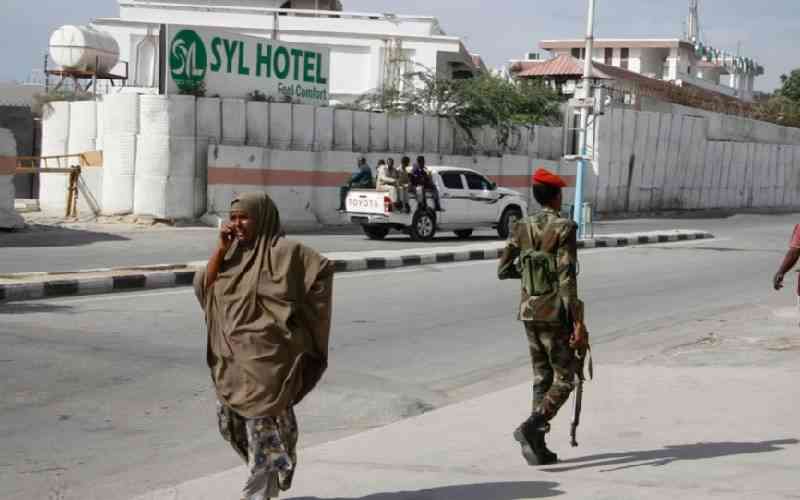MANDERA COUNTY: Could clashes between clans in Mandera County be giving Al Shabaab militants an easy access to their targets in North Eastern?
Some residents claim terrorists who recently struck Mandera exploited long-running clan feuds and historical grievances to facilitate their murderous mission. They are also thought to have taken advantage of the long and barely guarded open border with Somalia to get into the country, commit anarchy and dash back.
Initially, Nairobi bound buses used the traditional Mandera-Rhamu-El Wak route, a B9 road. The Rhamu route is far removed from the border and chances of cross-border militia attacks are minimal. It was safer, despite being longer. But bus companies now prefer the shorter Mandera-Arabiya-Lafey route. The latter route, however, is closer and runs parallel to the long border, a walking distance from the militia-infested lawless Somalia side.
Depending on who you talk to, the initially safer Rhamu route was avoided either on impassibility or insecurity grounds. Those who cite insecurity blame flare-up of clashes between the Garre and Degodia clans, exacerbated by results of last year’s elections. As a result, they say, there has been a sustained neglect of the area’s infrastructure.
“Rhamu route was abandoned due to persistent clashes between the clans residing along the old road. This caused insecurity along the road and it was abandoned for good,” Ahmed Ibrahim Ugas, an activist in Mandera town told The Standard on Sunday.
A Mandera-based civil servant says the route was in good use until 2012, when feuds between the Garre and Degodia made the area impassable. This led bus owners to pull out to avoid their buses being torched.
Those who cite impassibility, however, say the road was in use until 2012 when its condition deteriorated. “It was tarmacked in the late 1970s at the height of Ethiopia-Ogaden wars, mainly to divert traffic from the border area, which was quite unsafe. Over the years, it has worn out, until the tarmac disappeared. People continued to use it because the murram was still in good shape, until two years ago when it fell apart in complete disrepair,” area Senator Billow Kerrow said.
Whatever the reason, what is clear is that with the change of routes, economic activities also changed settings, as much of the locally produced stuff needed to be transported to markets farther away. The quarry where Al Shabaab militiamen raided and killed 36 non-Muslim Kenyans was closer to the shorter Mandera-Arabiya-Lafey route that is nearer to Somalia.
CLAN POLITICS
Soon after the bus attack that left 28 dead two weeks ago, area Police Commander Noah Mwivanda banned buses from using the Arabiya-Lafey route and redirected traffic to the longer Rhamu route, but with armed police escort. But there is still tension in Rhamu, where both Degodias and Garres reside.
The results of last year’s elections are said to have raised tension in Rhamu. In the poll, the Garre clan took most seats in the county.
The Garre are estimated to constitute about half the population in Mandera County, with Degodia coming second at a quarter of the population. The other clans share the remaining quarter.
The Garres took the positions of Governor, Senator and four of the six area constituencies, all on URP tickets.
A political pact with the Murrulle clan locked out the second populous Degodia, traditional enemies of Garre, out of the county government top leadership. Murrulles took the deputy Governor’s slot, the two other constituencies and the Woman Representative.
“Although clan politics is an internal affair, the fact of the matter is that the Garre take-over is a big issue and it is feeding into the insecurity experienced in the county in the last one year,” Ugas said.
Stay informed. Subscribe to our newsletter
Ordinary Mandera town residents say the perception that the Garre take-over is working against the interest of the Degodias has complicated matters and made Rhamu insecure. “Whether it’s real or imagined, the perception is there,” Ahmed, a local hotel worker said. Former Internal Security Cabinet Secretary Joseph ole Lenku when interviewed earlier in the week, said insecurity has many variables. He, however, emphasised that clan-based differences were the main problem.
“It’s the number one issue. There may be other variables like Al Shabaab influence, county leadership, historical issues, but clanism in terms of acceptance of other clans is one of the major issues fueling violence.”
Lenku was sacked on Tuesday, the same day news that 36 non-Muslim Kenyans had been killed by the Al Shabaab in Mandera broke. Of those killed, 18 were from Nyeri. Lenku said the exclusivist political approach of the current Mandera County government had further thickened the plot. “It is like the county government has decided to work and defend those who elected it and let others go hang,” Lenku said.
The two levels of government have not been pulling in the same direction, especially on matters security, in the last few months. The county government, led by Governor Ali Roba, has been calling for complete overhaul of the county security committee.
Kerrow concedes and explains: “Initially there was a good working relationship between the two, a mutual relationship you could say. The county government put reservists on payroll, bought vehicles and shared intelligence, which was acted on, but in the last three months the governor tells me things have changed.”
Kerrow says the Governor has reported that working with the new County Commissioner has become untenable and all intelligence shared out with national security agencies has been disregarded and dismissed instantly.
He says that is why the Governor has called for overhaul of the committee.
The senator says a temporary military base in Arabiya, close to the scene of the bus attack, was abandoned two weeks earlier without any notice to the county government. When The Standard on Sunday team flew to Mandera soon after the 28 were executed two weeks ago, the abandoned camp could be seen with only left-over drums lying about the compound.
HEINOUS CRIMES
Kerrow says the camp should not have been closed down at the time the town was coming under increased pressure through numerous attacks and infiltration of militants, information he says has been shared.
“The intelligence is increasingly being viewed in a Degodia-Garre feud angle hence the measure of distrust on its credibility. These are facts and it is time they were laid bare on the table. People are talking about them here,” the Mandera-based civil servant said.
This dysfunction arising from the clan perception, analysts say, has given room to militias to penetrate the county and plot heinous crimes like the ones witnessed in Arabiya and the various Improvised Explosive Device (IED) attacks, some targeting the Governor.
Kerrow is, however, convinced that this theory is “absolute nonsense.”
“The issue of clans does not feature anywhere in the relationship between the county government and national security apparatus in the county. Things were working until a few months ago. Besides, Al Shabaab is a common enemy for both governments and both clans,” he says.
Salah Abdi Sheikh, a scholar and publisher, says the Arabiya bus attack should not be viewed in isolation. He says context has been lost in the media narrative so far. He draws attention to death of between 105 and 135 residents in the county in the last two years.
Salah says the bus attack actually took place in his great grandfather’s farm. The village, Omar Jillaow, was named after his great grandfather who was slaughtered alongside his 21 male family members in an inter-clan feud about 100 years ago.
“The area generally, carries heavy negative vibrations. People are forgetting that a few months ago eight women and children were slaughtered in a similar manner in Ogorweyne village near Asxaabito,” he says.
The scholar says the Rhamu clashes earlier in the year saw the killing and displacement of many people from both sides of the warring clans until ceasefire was achieved through the Francis ole Kaparo-led initiative. Salah says the joke in Nairobi goes that the conflict ended after the two communities ran out of fighters.
HISTORICAL GRIEVANCES
Kaparo, who also chairs the National Cohesion and Integration Commission (NCIC), said the initiative was bearing fruit, but was quick to discount any connection between recent attacks and clan feuds.
“It did work, but we still have a long way. We had lengthy talks and we still have more rounds to make. We have impressed on all of them to work together as Kenyans and to distribute opportunities equally,” Kaparo says.
On the clan feuds misdirecting the bus routes hence the bus attack, Kaparo is categorical: “I don’t think so. They’d begun using the routes they were not using by the time we left there, but having said that, I was not there. I cannot know for sure.”
Salah says other factors informing the violence is the “sheer incompetence” loaded over the region by the national government. He says traditionally, and even with the new Constitution, civil servants tend to suspend the law whenever they are posted in the north.
And those who get posted there are posted there for the wrong reasons, mostly punishments. The result, he says, is getting an incompetent bureaucracy which tends to misinterpret and misapprehend issues from the area leading to wrong responses and quite often, escalation of small problems.
“Remember the case of the cop who was accused of wearing a mini-skirt, she was posted in Mandera, as a punishment,” Salah says.
According to the population census of the 2009, Mandera is the 11th most populous county in the country after Nairobi, Kiambu, Kilifi, Meru, Machakos, Nakuru, Kakamega, Migori and Kisii. It has a population of 1,025,756 people.
In contrast, infrastructure, health, security and education services are at their worst compared to other counties with lesser population. Decades of marginalisation and historical grievances combine to make it a perfect place for Al Shabaab infiltration.
 The Standard Group Plc is a
multi-media organization with investments in media platforms spanning newspaper
print operations, television, radio broadcasting, digital and online services. The
Standard Group is recognized as a leading multi-media house in Kenya with a key
influence in matters of national and international interest.
The Standard Group Plc is a
multi-media organization with investments in media platforms spanning newspaper
print operations, television, radio broadcasting, digital and online services. The
Standard Group is recognized as a leading multi-media house in Kenya with a key
influence in matters of national and international interest.
 The Standard Group Plc is a
multi-media organization with investments in media platforms spanning newspaper
print operations, television, radio broadcasting, digital and online services. The
Standard Group is recognized as a leading multi-media house in Kenya with a key
influence in matters of national and international interest.
The Standard Group Plc is a
multi-media organization with investments in media platforms spanning newspaper
print operations, television, radio broadcasting, digital and online services. The
Standard Group is recognized as a leading multi-media house in Kenya with a key
influence in matters of national and international interest.









